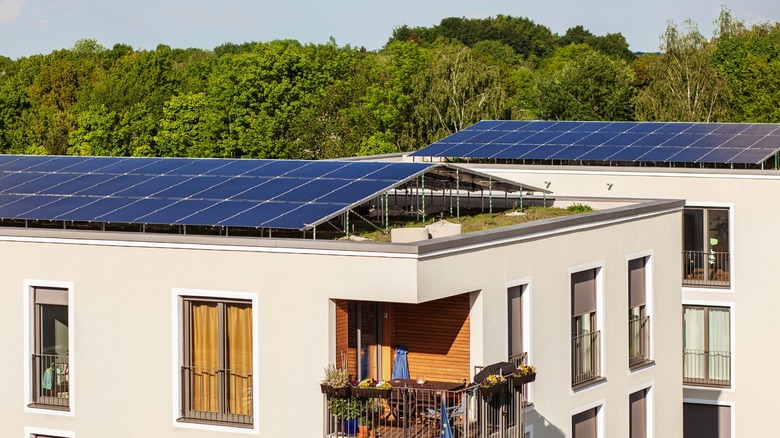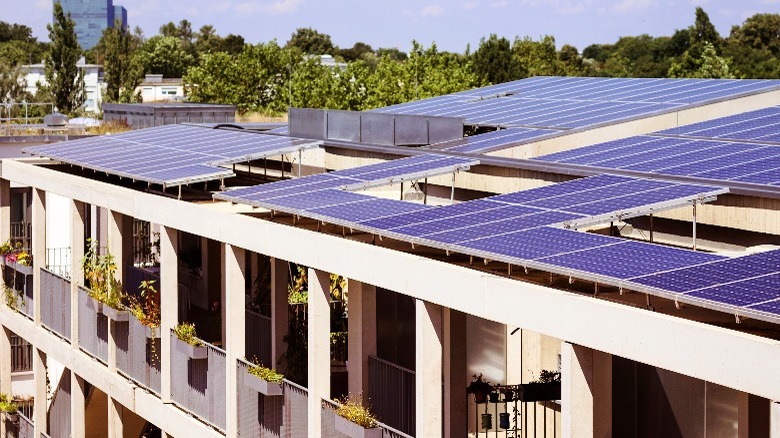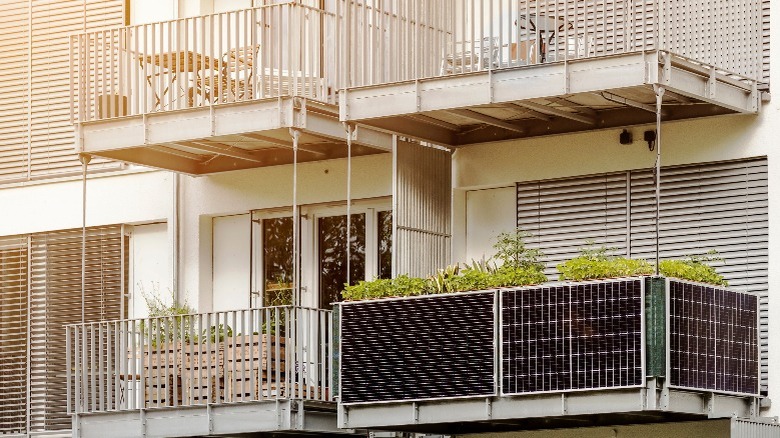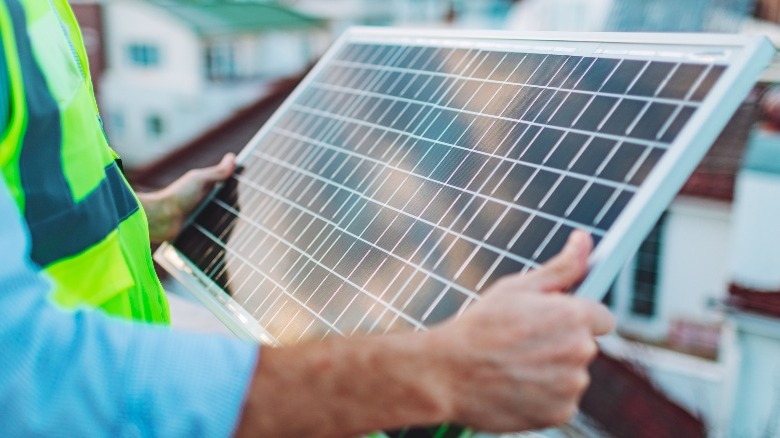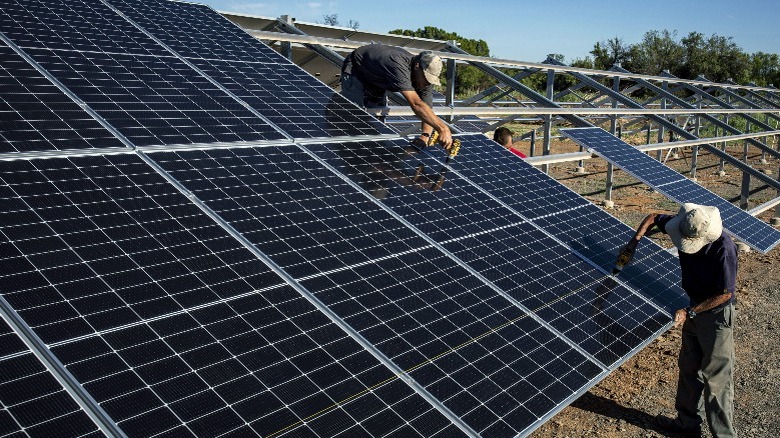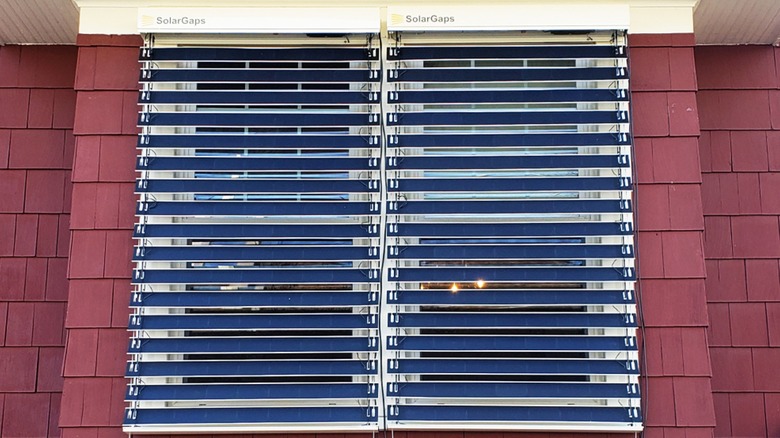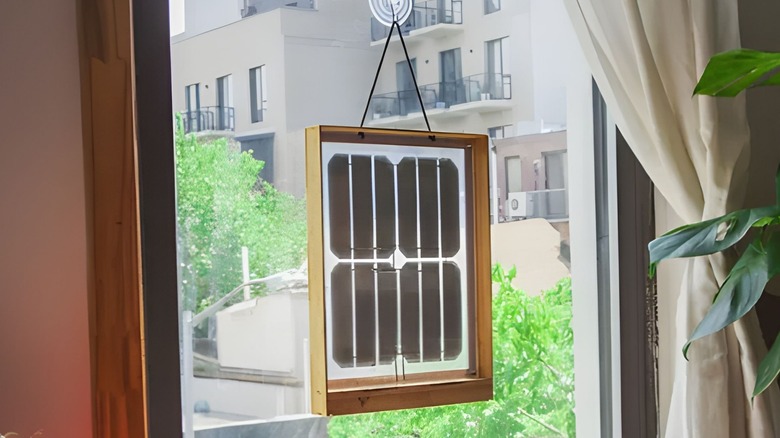Can You Use Solar Panels In An Apartment? What You Should Know
We may receive a commission on purchases made from links.
According to Zillow, at least 53% of U.S. Americans who rent live in an apartment building. With that number poised to grow thanks to the ever-increasing cost of homeownership, many renters are searching for ways to improve their renting experience and cut down on expenses. One of the ways that homeowners have been able to reduce their bills recently is to take advantage of modern, clean energy solutions, like solar. For homeowners, installing a solar setup isn't too difficult. They simply have to get permission from their local government to install the panels on their roof or choose to install them in a different location and then hire a company to complete the installation or do it themselves. For renters, things are a bit more complicated.
Firstly, it is possible to use solar panels in an apartment. However, that's a bit of a nuanced statement because installing solar panels in an apartment is not the same as doing it in a house you own. While you have many options for solar power, even in an apartment, there are several things to consider before you try to DIY a solar setup in your rental unit. You'll have to determine how much space you have available and how much power you can generate in that space. You should also keep in mind the fact that you may need permission from your landlord, especially if you want to install a more robust solar system. We explored various types of solar panels, from portable window panels to complete terrace setups, and we composed this article based on expert advice and consumer testimony. That said, we'll dive into our methodology later. For now, here's everything you need to know about using solar panels in an apartment.
Yes, you can use solar panels in an apartment
A common solar panel myth is that you can't use them if you rent. The first thing you need to know is that you can use solar panels in an apartment or another type of rental. However, the process of installing solar panels differs a bit for renters.
The biggest and most significant difference between installing solar panels in a home you own and one that you rent is the space you have. Residential homeowners typically install solar panels on their roofs. If you live in an apartment building, that's probably not possible. Even if you do have rooftop access in your building, your landlord may not allow you to install solar panels.
And why should you? A rooftop solar setup can be pricey. Yes, they increase property value and provide tax incentives. But remember, you don't own your apartment building. You won't be the one to receive those benefits, and paying out of pocket to install a solar setup that you can't even keep if you decide to move probably isn't the wisest choice for most renters. All that said, it doesn't hurt to discuss solar with your landlord to see what your options are. They may be more receptive than you think, and if you sell the benefits well enough, your entire building could see its energy costs plummet.
The power your panels produce depends on your available space
The second thing you need to consider is how you plan to use your available space. You should know that, ideally, solar panel setups should face true south — if you live in the Northern Hemisphere, that is. If your solar panels face east or west, they'll yield about 20% less power, while solar panels that face north produce roughly 30% less energy. That means that the direction your apartment faces plays a prominent role in how efficient your solar setup can be. If you live in a tiny apartment with windows facing north, east, or west, you probably won't be able to generate enough energy to power substantial parts of your home. But that doesn't mean solar isn't for you. Even minimal amounts of solar energy are enough to charge power banks and provide power to small devices.
If you live in a large apartment with many windows, especially south-facing windows, you have more options. While the optimal location and orientation for a solar setup is on the roof facing south, you can still generate a respectable amount of energy in other ways. For example, if you have a south-facing balcony in your apartment, you may be able to generate enough energy to power your entire apartment. On the other hand, if all you have is windows, you can choose to install solar panels there. However, keep in mind that window glass blocks part of the sun's UV rays. So, if you decide to install solar panels on a window, you should hang them outside and route your wires through the window into your home.
You may need permission from your landlord and your state government
If you're considering a solar setup, you can't just go out and install one without jumping through a few hoops first. For rooftop solar arrays, you basically always need to get a permit from your local government. While that likely doesn't apply to most renters, it's worth keeping in mind that you'll need a permit for most forms of construction or property modification. However, even if you live in an apartment and aren't able to install rooftop solar panels, you still may need permission from your landlord to install your setup.
Generally speaking, you don't need your landlord's permission to install portable solar panels, like those you hang outside a window or place on your balcony. However, if you plan to make modifications to the property — i.e., if you plan to install a solar setup that requires drilling into a wall or installing brackets to hang solar panels on your balcony — you'll most likely have to ask your landlord first.
You don't have to go it alone when installing solar panels
Something else you should keep in mind when considering solar is that you don't have to do it alone. Community solar projects are a great way to work together with your neighbors and community to lower your electric bills and help the environment, and they're one of the best green energy alternatives for people who can't use solar panels. Instead of installing your own solar array, community solar projects allow you to buy into an offsite solar farm. These solar farms are typically owned by community group members or by a nonprofit organization. Each member contributes to the farm's installation and maintenance or pays a subscription fee, and each receives a portion of the electric power that the farm generates. If you pay your own electric bill in your apartment, you do not need your landlord's permission to join a community solar project.
Another option is to form a tenants union in your apartment complex. Doing so allows you to join forces with your neighbors to petition your landlord. Not only are unions a great way to have your voice heard regarding solar panels, but they can also help you improve your overall conditions as a renter. Your landlord may be able to say no to fixing one tenant's leaky pipes, but if you all join together and demand action, it will be much more difficult for the property owner to ignore your requests.
There are more options than you may think
When most people think of solar power, they probably imagine massive solar farms or rooftop solar arrays. Either way, they're most likely picturing traditional solar panels mounted in a way that's more or less permanent. However, there are a surprising amount of solar power options for average consumers. In addition to traditional rooftop solar arrays, you can purchase portable solar panels for your windows or balcony or install a more permanent setup in various locations. Some common locations for higher-quality permanent setups include windows and balconies. Let's explore some popular solar panel brands and styles that may be useful for renters.
Portable solar panels, like the Jackery SolarSaga 200, Grouphug Window Solar Charger, and Geneverse SolarPower One, allow you to generate solar energy wherever you are. You can slap these panels outside your window, set them up on your balcony, or even attach them to the top of your car for free power during a road trip. Portable panels come in various sizes and provide power levels ranging from minimal to mid-level.
More permanent setups include things like SolarGaps, which are like blinds that you install on the outside of your windows. These blinds follow the sun's position automatically through the day, meaning they self-optimize and self-adjust to provide you with maximum energy collection. They also work like standard blinds, shielding your apartment from the sun and heat.
If you have a balcony, you can also choose to install a more traditional solar setup. We Do Solar is a company that produces exterior solar arrays that are designed to be easy to install and generate impressive amounts of energy. If you have enough space, a We Do Solar setup may even be able to power your entire apartment.
Methodology
When writing this article, we considered a few criteria: consumer testimony, expert advice, and legal statutes. We pulled information from various sources, including the U.S. government, solar industry experts, and real consumers who have navigated the process of installing solar in their apartments. We conducted a thorough investigation to provide you with a complete picture of what it takes to use solar in an apartment and the things you need to know before installing your own solar setup.
Finally, we explored a few popular solar products that work for renters. We chose items that have overall positive reviews and excellent customer feedback, and we included various products to help you understand that your options aren't as limited as you may think. That said, you should always do your due diligence before purchasing an expensive product or making modifications to your home or apartment. Remember to check your local laws, consult your landlord, and look into alternative options like community solar projects before you make your ultimate decision.
